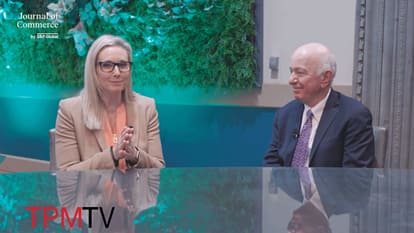- Program
- What's New
- Speakers
- Who's Attending
- TPM Community
- Partners
- Media

TPM TV
Episodes of exclusive TPM content featuring interviews of key stakeholders and attendees.
WATCH NOW - About

About TPM
The must-attend conference for the trans-Pacific and global container shipping and logistics community
LEARN ABOUT TPM - Get Updates
- FAQ's
Repairing the damage
August 22, 2023
Shipper-carrier relationships, where trust is always elusive, were in many cases shattered during Covid and are only now in the very early days of being repaired. Some BCOs with years of experience knew the market was tight and were surprised with the allocations they did receive from carriers, even if less than 100% of their MQC.
Others however were shocked at the realization that their signed contracts were worthless as they were sent out into the wilds of the spot market where rates often exceeded $20,000 per container, materially reducing their profits as carriers racked up historic gains.
"As vessel space became scarce, vessel bookings were routinely delayed or cancelled, and ocean carriers ignored contractual service commitments forcing their contract shippers to purchase vessel capacity at substantially higher spot market rates,” the National Industrial Transportation League said in recent filed comments to the FMC, reflecting many shippers’ sentiments.
"The scars left by the congestion, lack of vessel space, not to mention exorbitantly high freight rates, still remain,” Stephanie Loomis, Americas head of ocean freight for Renus Logistics, wrote recently on LinkedIn.
What is the way forward as the market normalizes? Shippers aren’t the only ones lacking trust as carriers have their own experience of shippers not honoring their own commitments when spot rates fall below contract rates. But irrespective of their differences, at the end of the day shippers, carriers and NVOs need each other; in fact they can’t do business without each other.
This is one of the themes that will define #TPM24 including the program and the tens of thousands of meetings that take place during the event; repairing the damage, renewing relationships, moving beyond an historically difficult stretch, re-establishing normality to the extent possible.
Join us in Long Beach on March 3-6, 2024, for the premier global ocean container supply chain conference. Build your expertise and your network through an editorially independent program of keynotes, fireside chats, panels, TED-style talks, shipper case studies, and the TPM Academy, plus unparalleled networking.
About the Journal of Commerce
The Journal of Commerce is produced by a team of specialized, subject-matter expert journalists providing original daily news analysis of international logistics for corporate logistics teams and other participants in global supply chains. We are accountable to paying subscribers who demand that our news and analysis be accurate, fair, independent, and informative. Part of S&P Global, the editorial team leverages extensive data assets and relationships built over many years throughout trade and transportation to deliver trusted, executive-level insights relied upon by senior logistics executives. The Journal of Commerce group builds on its expertise and source relationships to develop industry-leading conferences including TPM, Breakbulk, and Inland Distribution.
